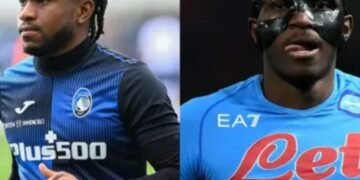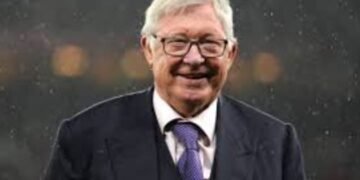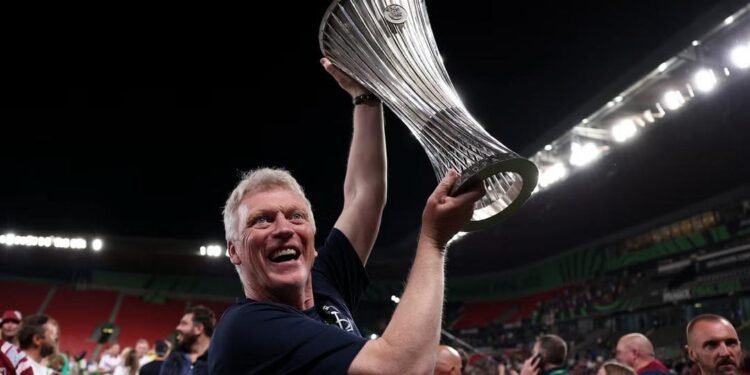David Moyes will always have Prague, dad dancing in the dressing room to the Proclaimers after, a quarter of a century into his managerial career, winning his first major trophy and West Ham’s first piece of silverware for 43 years.
Eleven months on, Moyes’s departure had come to feel football’s worst-kept secret, and if all clubs have to engage in succession planning, it reflected doubly badly on them when Sporting Lisbon’s Ruben Amorim felt the need to apologise for meeting the reigning Europa Conference League champions. And while Julen Lopetegui will instead prove Moyes’ successor, part of his legacy is that a club who were in danger of dropping into the Championship when they sent an SOS to the Scot in 2019 now have a continental honour.
It is a reason, though far from the only one, why Moyes leaves West Ham as their best manager since John Lyall, probably their third finest ever. A recent record of just four wins in 2024, a distinctly unMoyesian defensive record that shows 70 goals conceded and a propensity to get thrashed that is out of character with the Scot’s usually resilient and organised sides suggest it is time to go. So too a climate where it felt that every defeat brought dissent against Moyes from the stands. That would not have been a basis to start next season.
And yet, even among West Ham’s recent struggles, it is worth noting that they are ninth, behind eight clubs with bigger budgets. If stylistic issues – low on possession, high on goals conceded – also form part of the picture, it is not underachievement. Beat Luton on Saturday and Moyes may get a 13th top-nine finish of his Premier League career; arguably only one – at Manchester United – was actually underperforming.
That forms part of the grounds to celebrate his reign; or reigns, really, given that West Ham should not have dispensed with his services in 2018. In two half-seasons, he twice saved them from relegation. He then secured the first back-to-back top-seven finishes in their top-flight history before winning silverware.
It is particularly noteworthy because Moyes walked into a club with a tradition of inconsistency. Slaven Bilic, Sam Allardyce, Gianfranco Zola, Alan Pardew and Glenn Roeder all had one fine season in the Premier League. None mustered a second. Unglamorous but unrelenting, Moyes was a manager out of keeping with West Ham’s past. He would sign flair players – Mohammed Kudus and Lucas Paqueta the best – but the rest of the team sought few points for artistic merit.
West Ham did not try and play the same brand of football as the elite. And yet a way in which he gave them a status was that they secured a healthy number of wins over their superiors: Arsenal were beaten twice this season, Manchester United, Tottenham and Chelsea once apiece. Much as West Ham became fixtures in Europe again, they became a team who could compete in England.
If some of that was because of Declan Rice, and after Sunday’s 5-0 thrashing at Chelsea Moyes attributed some of their problems this season to the loss of the £105m man, the transformation of others, from Jarrod Bowen to Michail Antonio via Craig Dawson and Tomas Soucek, showed Moyes’s capacity to improve players who shared his own humbler origins further down the footballing pyramid.
On the debit side, Bowen and Antonio were required to score amid the failings of some of the other forward signings, whether Gianluca Scamacca or Danny Ings, Maxwel Cornet or Nikola Vlasic, or the men Manuel Pellegrini left, in Felipe Anderson and Sebastien Haller. Perhaps it reflected the wider struggle to play better football.
With the oddity of a recruitment team where he and director of football Tim Steidten wanted very different targets but, in Kudus, Edson Alvarez and James Ward-Prowse, excellent players were nevertheless signed, Moyes still leaves arguably West Ham’s strongest squad for two decades, despite a couple of missteps this season.
Choosing Kurt Zouma as captain seems one, amid the disastrous defensive record and capitulations. Allowing Pablo Fornals and Said Benrahma to go in January, reducing the attacking options, and instead signing Kalvin Phillips, whose loan in London has been calamitous, was another. If Phillips brought a case of West Ham regressing when they wanted to kick on, there were illustrations of it in the days before Moyes, too.
And so it will be Lopetegui, another European trophy winner, a man whose stint at Real Madrid was briefer than Moyes’ time at United, a manager whose rescue job at Wolves was arguably still more impressive than the Scot’s firefighting jobs with West Ham.
A gifted coach should arrive with one major concern. Lopetegui’s petulant exit at Molineux came when, after spending £75m, he agitated for further signings. Wolves sold instead, because they had to in order to pass Financial Fair Play. Had he got his way, they would have faced a points deduction.
West Ham nevertheless sense an upgrade on Moyes. But if Pellegrini’s troubled time in London does not mean that history is guaranteed to repeat itself, West Ham’s past should show the Moyes years represent a high point. And for him, Prague may forever represent the highest.













































